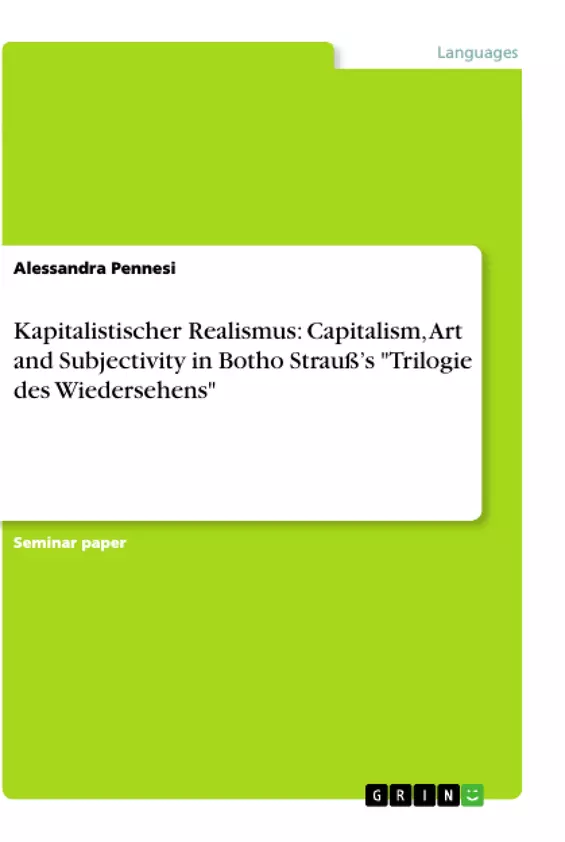"The Trilogie des Wiedersehens" is surely a controversial play: there is no real plot but just a series of characters brought together into the space of an art exhibition. The audience is put in a critical position as they are asked to observe the attitude of the characters towards the works of art on stage as well as to analyze their own attitude towards the play. Taking the title given to the exhibition as a starting point, the main question I want to address is how the Trilogie depicts the effects of capitalism on the way art is experienced by the individual and how the function of the artist has changed with the emergence of a profit-centered society. Confronting the Trilogie with Steiner’s text Real Presences, I will see how the capitalistic process of commodification of reality can be understood in terms of the logic of the secondary, which aims at hampering the directness of art and at stifling its communicative power. In the light of these considerations I will also try to delineate the two opposite options that the play suggests about the development of art in a capitalistic society: either it succumbs to being objectified and turned into intellectual merchandise, or it becomes a means through which the self can transcend his individuality and thus reach a spiritual and moral liberation. Eventually, taking into account Theodor Adorno’s theories about cultural industry, I will try to analyze how some characters in the play seem to warn against the danger, in a society dominated by mechanized production, for the subject to be alienated from their own subjectivity.
Inhaltsverzeichnis (Table of Contents)
- Introduction
- The Logic of Capitalism as Secondary Discourse against the Autonomy of Art
- Creation versus Commodification: the new Role of the Artist
Zielsetzung und Themenschwerpunkte (Objectives and Key Themes)
This essay examines the impact of capitalism on the experience of art and the artist's role in a profit-driven society. It explores the commodification of art and the consequences of secondary discourse on the interpretation and appreciation of artistic works.
- The effects of capitalism on the individual's experience of art
- The changing function of the artist in a capitalist society
- The relationship between art and secondary discourse
- The commodification of art and its implications
- The role of the artist in a mechanized society
Zusammenfassung der Kapitel (Chapter Summaries)
The first chapter introduces the essay's main question: how does the Trilogie des Wiedersehens depict the impact of capitalism on the individual's experience of art? The essay then explores the logic of capitalism and its relation to secondary discourse, which often serves to suppress the immediate and direct engagement with art.
Chapter two delves into the relationship between capitalism and art, highlighting the potential for art to be reduced to intellectual merchandise. The essay analyzes the characters' interactions with the paintings and their tendency to impose a predetermined logic upon the artwork, highlighting the influence of ideology on art interpretation.
Finally, chapter three discusses the transformation of the artist's role in a mechanized society. The essay examines the conflict between artistic creation and commodification, using the characters Marlies and Felix to illustrate the contrasting ideologies of artistic expression and commercialization. The chapter explores how secondary discourses can affect the artist's ability to engage with the world and express their individual creativity.
Schlüsselwörter (Keywords)
The main keywords and focus topics of the essay are: capitalism, art, subjectivity, secondary discourse, commodification, artist, creation, commodification, culture industry, Trilogie des Wiedersehens, Real Presences, Der Aufstand gegen die Sekundäre Welt, Kulturindustrie.
Frequently Asked Questions
What is the central question of this essay?
The essay explores how Botho Strauß’s play "Trilogie des Wiedersehens" depicts the effects of capitalism on the experience of art and the changing role of the artist.
How does capitalism affect the individual's experience of art?
Capitalism can lead to the commodification of art, where artworks are treated as intellectual merchandise rather than direct communicative experiences.
What is the "logic of the secondary"?
Based on George Steiner’s work, it refers to discourses that hamper the directness of art and stifle its communicative power through over-interpretation and ideology.
What role does the "culture industry" play in the analysis?
The essay uses Theodor Adorno’s theories to analyze how subjects in a mechanized society risk becoming alienated from their own subjectivity.
Can art still serve as a means of liberation?
Yes, the play suggests that art can either succumb to objectification or become a tool for the self to transcend individuality and reach moral liberation.
- Quote paper
- Bachelor of Arts (English- German) Alessandra Pennesi (Author), 2018, Kapitalistischer Realismus: Capitalism, Art and Subjectivity in Botho Strauß’s "Trilogie des Wiedersehens", Munich, GRIN Verlag, https://www.hausarbeiten.de/document/906921


